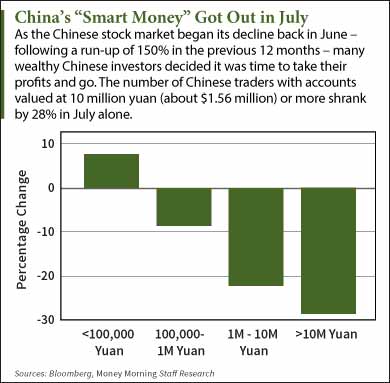One reason behind the brutal 8.5% loss suffered by China's stock market today (Monday) is that its wealthiest investors - China's "smart money" - are no longer around to help prop up prices.
 In the United States, "smart money" is a term describing experienced, well-informed investors who understand how to use market movements to their advantage.
In the United States, "smart money" is a term describing experienced, well-informed investors who understand how to use market movements to their advantage.
China's smart investors did very, very well in the year leading up to China's stock market crash. In the 12 months prior to mid-June, the Shanghai Index rose 150%. China's smart money got in early for the most part and enjoyed the ride.
But when China's stock market began to falter, the smart money took the hint and started for the exits.
According to Bloomberg, the number of traders with holdings worth 10 million yuan ($1.56 million) or more declined by 28% in July, according to China Securities Depository and Clearing Corp. data. The number of traders with holdings worth between 1 million and 10 million yuan fell by 22%.
Meanwhile, the number of accounts with holdings of less than 100,000 yuan (about $15,613) rose by 8%.
Of course, some of that was the result of the decline of China's stock market. But China's smart money clearly saw a chance to do a little profit-taking ahead of a broad market sell-off.
The Smart Money Saw China's Stock Market Crash Coming
"Wealthy investors, who have been through bear markets, are better at exiting," Hu Xingdou, an economics professor at the Beijing Institute of Technology, told Bloomberg.
And the heavy government intervention in China's stock market presented the smart money an easy way to exit their positions and preserve most of their gains. The Chinese government and entities acting on its behalf conveniently bought up the shares the smart money wanted to sell.
Good for them, but not so good for another group of investors...
[epom key="ddec3ef33420ef7c9964a4695c349764" redirect="" sourceid="" imported="false"]
Meanwhile, the government buying raised confidence among China's small investors. They held on - or bought more. That group got hammered again today.
With the latest 8.5% fall, China's stock market now has suffered a decline of 38% since the mid-June peak. With the government backing off and much of the smart money on the sidelines, there's little to prevent China's stock market from sliding even further.
"The high net worth clients are the ones who moved the market," Francis Cheung, the head of China and Hong Kong strategy at CLSA, told Bloomberg. "They tend to be more savvy."
For now, China's smart money appears to be moving capital out of the country to overseas investments. They won't move back into China's stock market until they're satisfied the prices are worth paying.
"China's capital outflow in July coincided with big investors selling shares," Steve Wang, chief China economist at Reorient Financial Markets Ltd. in Hong Kong, told Bloomberg. "Small players have been drawn in by government measures to support the market, while wealthy investors cut their stakes."
Watch the video for an explanation of China's stock market crash, plus how investors can protect themselves – and even profit – from these events…
Follow me on Twitter @DavidGZeiler.
A 25-Year Depression? Jim Rickards, who once served as the CIA's Asymmetric Threat Advisor, for years has been warning Americans about threats to the U.S. economy everyone else has ignored. In this exclusive Money Morning interview, Rickards explains why these threats could send America into a 25-year depression. To watch this must-see interview, click here.
Related Articles:
About the Author
David Zeiler, Associate Editor for Money Morning at Money Map Press, has been a journalist for more than 35 years, including 18 spent at The Baltimore Sun. He has worked as a writer, editor, and page designer at different times in his career. He's interviewed a number of well-known personalities - ranging from punk rock icon Joey Ramone to Apple Inc. co-founder Steve Wozniak.
Over the course of his journalistic career, Dave has covered many diverse subjects. Since arriving at Money Morning in 2011, he has focused primarily on technology. He's an expert on both Apple and cryptocurrencies. He started writing about Apple for The Sun in the mid-1990s, and had an Apple blog on The Sun's web site from 2007-2009. Dave's been writing about Bitcoin since 2011 - long before most people had even heard of it. He even mined it for a short time.
Dave has a BA in English and Mass Communications from Loyola University Maryland.



